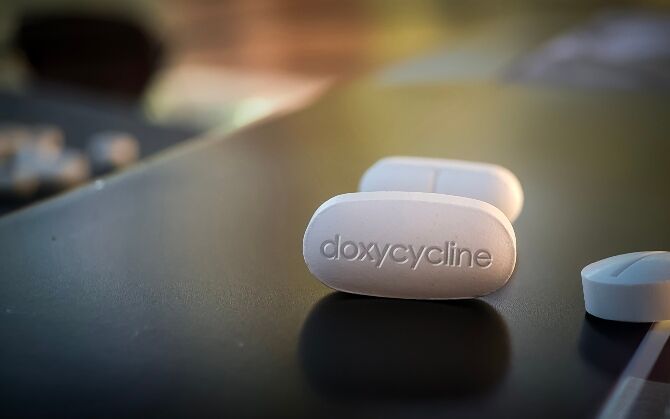
A new study has reported on the impact of DoxyPEP in San Francisco. The California city, with its high proportion of gay men, has been among the first to recommend prescribing DoxyPEP to high-risk communities.
DoxyPEP is short for Doxycycline Post-Exposure Prophylaxis. It involves taking a single, 200 mg dose of the antibiotic doxycycline within 72 hours of a sexual encounter to minimize the chances of acquiring an STI such as gonorrhea, chlamydia or syphilis.
San Francisco began allowing health providers to distribute the antibiotic for this purpose in late 2022. It advised giving the medication to gay men who have multiple partners, and to trans women.
How about we take this to the next level?
Subscribe to our newsletter for a refreshing cocktail (or mocktail) of LGBTQ+ entertainment and pop culture, served up with a side of eye-candy.
Around 40% of people taking PrEP in the city have now also tried DoxyPEP. Organizations say they’ve been encouraged by the large number of gay men who want to take it.
Last October, the CDC issued its first official guidelines regarding DoxyPEP. It gave the treatment its approval. The organization is exploring all means necessary to try and reduce soaring STI rates in the US. Experts had been holding off as there are concerns around over-prescribing antibiotics. However, trials have found little evidence of DoxyPEP increasing resistance in the bacteria it targets.
That said, the CDC guidelines were a little less liberal than those in San Francisco. It recommended DoxyPEP as an option for gay men and trans women who have had a positive STI diagnosis in the past year. You don’t need an STI diagnosis to get DoxyPEP in San Francisco.
Fifty-eight per cent decrease in STIs
This week, at the Conference on Retroviruses and Opportunistic Infections (CROI 2024), researchers presented results from SF.
They say that in the year after the city began prescribing DoxyPEP cases of chlamydia dropped steeply. Syphilis cases also dropped significantly. However, there was only a slight drop in gonorrhea, reports aidsmap. Overall, there was a 58% decrease in STIs for those taking DoxyPEP.
That’s good news and encouraging to those concerned about the nation’s sexual health.

Experts welcomed the real-world results alongside further trial data.
“It’s not often in public health that you have population-level surveillance in concordance with clinical service delivery in concordance with clinical trial results, all at the same time,” CROI chair Professor Landon Myer of the University of Cape Town said at a media briefing. “This, to my mind, seals the case.”
Besides the results from San Francisco, the conference heard results from a trial in France. Last year, that study reported a 70% reduction in STIs in gay men on DoxyPEP. That trial was extended. The trial was unblinded. In other words, the participants were told if they’d been prescribed DoxyPEP or a placebo. They were then all offered DoxyPEP if they wanted it.
Many men did indeed want to take the medication. That group showed a similarly steep drop in STIs to that seen in San Francisco.
In contrast, a study in Kenya was unable to repeat the results in young, cisgender women. Syphilis is rare among this group in this part of the world. However, the DoxyPEP did not reduce chlamydia levels. It’s unclear why.
It’s also unknown why DoxyPEP is less effective at reducing gonorrhea. One suggestion is that DoxyPEP needs to be taken sooner after sex. However, more research is needed to find out if this is the case.
Exciting new tool
Jorge Roman is the Senior Director of Clinical Services at the San Francisco AIDS Foundation. It has been prescribing DoxyPEP since late 2022. He welcomed the study results.
“We are noticing an impact of Doxy PEP on reducing sexually transmitted infections,” Roman said in a statement.
“For so long, we have only been able to rely on condoms for STI prevention–and we know that condoms don’t work for everyone. There is a clear need for additional strategies to reduce STI rates–in San Francisco, and across the U.S., the number of cases of chlamydia, syphilis, and gonorrhea have been on the rise for many years. It is exciting to have a new tool that we can make available for STI prevention.”
Related:
DoxyPEP, a.k.a. the “gay morning after pill”, set to receive CDC stamp-of-approval in preventing STIs
The antibiotic has been highly effective in preventing STIs like chlamydia and gonorrhea.
Good & bad news from the CDC about sexually transmitted disease rates
Gonorrhea rates fell for the first time in ten years – but a more dangerous infection is on the increase






















iowadude
“This major US city…” Honestly, back to clickbaiting your article titles?
Openminded
Great short term news, Terrible long term news, IMHO. Everyone knows we are in an antibiotic crisis with the prevalent misuse of antibiotics and increased antibiotic resistant variants of infections. How long until Doxy won’t stop the STDs? What will be prescribed then? Of course, that will be the next generation’s problem so screw condom use and safer sex practices and get on Grindr and have some fun. Why can this community not be thankful for the protections of PreP and Antibiotics while still having responsible safe sex instead of looking at these drugs as a license to be irresponsible?
chasr6017
Avoid this drug if you have any kidney issues…even mild ones.
Myself, I have mild kidney disease and maintain a function between 75% to 85% function (diagnosed 3 yrs ago at 55% in my mid 40s, but with diet & 3 liters of water daily raised/maintain it). I get bi-monthly tests to ensure my function and sexual health is solid. After taking Doxy Pep once at end of October and November by kidney function showed to below 60% and it’s never been that low since my diagnoses.
Ive taken regular doses of Doxy without issue the past few years but the high doses had a negative affect on my kidney function. Thankfully it was temporary yet my kidney doc tells me i should avoid it that and all medications as i do…best i can!
MaritimeNerd
Thanks for the update.